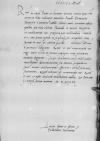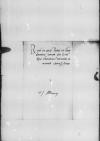Letter #3603
Łukasz GÓRKA to Ioannes DANTISCUSPiotrków, [1538]-03-02
| received [1538]-03-11 Manuscript sources:
| ||||
Text & apparatus & commentary Plain text Text & commentary Text & apparatus
Reverendissimo in Christo Patri et Domino, domino
Reverendissime in Christo Pater et Domine, domine amice carissime.
Domum hinc redeunte domino
Quod reliquum est, commendo me Reverendissimae Dominationi Vestrae et opto dudum incolumem valere.
Ex

